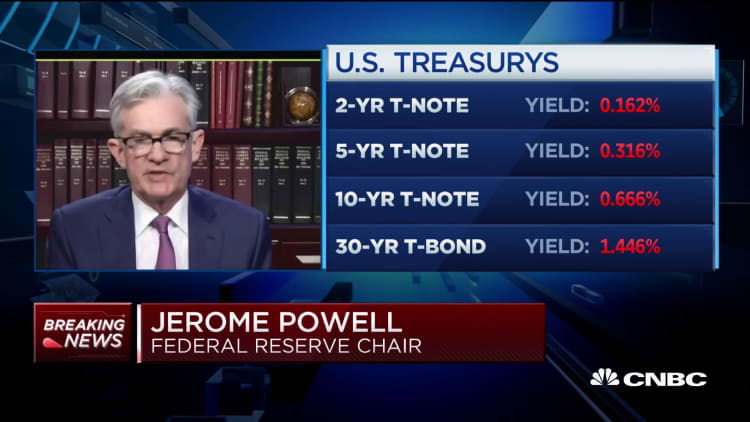Getting the U.S. economy back to strong growth could require negative interest rates, according to a St. Louis Federal Reserve economist.
As many economists dismiss the likelihood of the current record-breaking slump being followed by an equally aggressive recovery, central bank economist Yi Wen said in a paper on the St. Louis Fed's website that achieving that kind of a rebound is necessary and possible.
The key, he said, is using aggressive stimulus even beyond what authorities deployed during the financial crisis, and that could include taking interest rates below zero.
Wen compared the response to two major U.S. economic downturns: the Great Depression and the financial crisis. He found that the use of aggressive fiscal response through President Franklin Delano Roosevelt's New Deal helped generate a V-shaped recovery after the Depression, while primarily monetary responses like low interest rates and Fed asset purchases during the financial crisis produced an L-shaped recovery in which GDP failed to reach potential.

"I found that a combination of aggressive fiscal and monetary policies is necessary for the U.S. to achieve a V-shaped recovery in the level of real GDP," Wen wrote. "Aggressive policy means that the U.S. will need to consider negative interest rates and aggressive government spending, such as spending on infrastructure."
Wen said the combination of policies will be needed so the U.S. can generate an S-shaped pattern, in which growth starts slowly and then quickly bursts higher. Without it, "the economic consequences of the coronavirus pandemic will be permanent," he wrote.
Not 'an appropriate tool'
Fed Chairman Jerome Powell and other central bank officials have been emphasizing the possibility that more fiscal measures will be needed. Congress has passed the $2.2 trillion CARES Act, but Fed officials said higher public spending could be needed as the economic crisis lingers.
But Powell and his colleagues also have expressed strong doubts about whether negative interest rates would ever be used in the U.S., as they have in Europe and Japan. They cite little evidence that below-zero yields are effective, and Powell pointed out, in a discussion last week, that they tend to be detrimental to banks.
"We don't think that's an appropriate tool here in the United States," Powell told former Fed Vice Chair and now Princeton University economist Alan Blinder. "I would say the evidence on whether it actually works is mixed. There are clearly some negative side effects, as there sometimes are with these things, and it's just not clear to my colleagues and to me on the Federal Open Market Committee that this is a tool that would be appropriate to deploy here in the United States."
Indeed, Wen's paper is merely one observation on the issue and is in no way binding on the Fed as a whole.
While stopping short of going negative, the Fed has pulled its primary policy level that serves a baseline for many other rates down to near zero. It also is purchasing bonds again, though this time with more of a focus on market functioning than as an economic stimulus.
Short-term Treasury yields occasionally have dipped into negative territory, and traders in the fed funds futures market are indicating that the Fed's benchmark could dip slightly below zero starting in May 2021.
Wen added that negative rates by themselves won't be enough stimulus to return an economy that had been growing at a solid pace back to its former self.
"Importantly, these policies also need to continue even when the crisis is about to end to provide a further boost, leading to a more robust recovery," he wrote. "Furthermore, it's the combination and coordination of both monetary and fiscal policies that provides enough stimulus for a V-shaped recovery. In other words, aggressive monetary policy — such as negative interest rates — may be ineffective on its own without aggressive fiscal stimulus."



